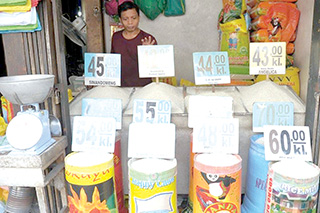Rice smuggled via Sabah sparks crisis
Published on: Saturday, August 25, 2018

Kota Kinabalu: The rice crisis in Zamboanga City including provinces of Basilan, Sulu and Tawi Tawi in southern Mindanao where prices have soared to P70 per kg, is seen as a warning to the country not to rely on imported rice.The crisis in these areas might spread to other areas if the government continue to depend on imports including smuggled rice to satisfy local demand .This was disclosed by the country's Agriculture Cabinet Secretary Emmanuel Piñol in a interview aired nationwide including in social media.
ADVERTISEMENT
"For many years, these areas have relied on smuggled rice from Vietnam and Thailand, which are brought into the country via Sabah, Malaysia.However, despite the decision of to strictly curb illegal activities at the borders of the two countries, traders continue to actively bring smuggled essential goods from Malaysia through Sabah.Smuggled rice is sold in the market at prices lower than locally-produced commercial rice and local officials hardly lifted a finger to stop the illegal activity," Piñol said.The supply shortage came the after Malaysian Prime Minister Tun Dr Mahathir Mohamad and President Rodrigo Roa Duterte agreed to stop illegal activities in the borders of both countries.
ADVERTISEMENT
While the move was aimed at addressing the movement of terror groups, it also stopped rice smuggling operations, thus cutting the supply of cheap rice to Zamboanga and nearby regions. "When smuggling was stopped, prices of rice in the markets started shooting up and consumers asked for the government subsidised rice from the National Food Authority (NFA) which they ignored in the past," Piñol said.
ADVERTISEMENT
Piñol emphasised there was no serious effort to develop and support the rice industry in the affected communities as good quality smuggled rice was available for only P29 to P35 per kg."Rice farmers abandoned their farms and shifted to other agricultural activities, including fishing because there was no way they could compete with the cheaper smuggled rice," Piñol said."Even local rice traders who used to buy and sell locally produced rice, including legally imported rice, abandoned the business because they said they could not sell their stocks," he added.The country would be highly dependent on imported rice and the rice exporting countries could dictate the prices. The Philippines would end up paying more for imported rice just like what happened in 2008," he warned.The arrival of fresh stocks, she said, is expected to stabilise the prizes.Meanwhile, the population of the world's rice exporting countries is growing, just like the Philippines. Stay up-to-date by following Daily Express’s Telegram channel.
Daily Express Malaysia




